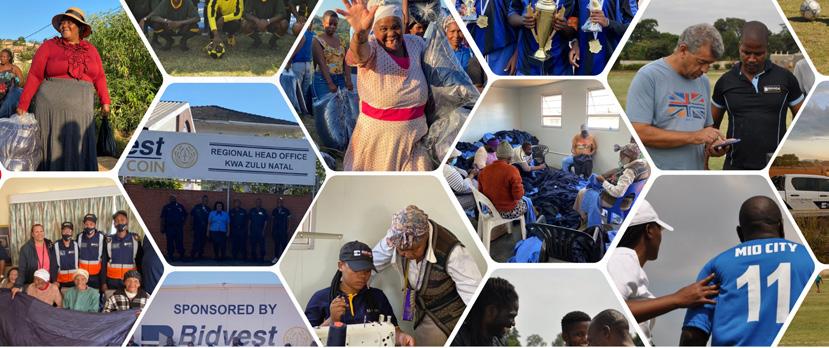
4 minute read
Unlocking the freedom of movement
from ConneCT 2022
Of
The current transport system in Cape Town faces significant challenges, with high levels of congestion and the collapse of rail making travel costly and timeconsuming for many commuters.
Advertisement
Public transport services, particularly rail, require urgent attention. However, improvements must take place in the context of very limited funding for large capital investments in new public transport modes and corridors.
The City of Cape Town intends to pursue the incremental improvement of public transport infrastructure and operations in a way that delivers maximum benefit, for the greatest number of commuters, as quickly as possible. This programme will focus on integrating different modes of public transport to improve access and the safety, convenience, reliability and quality of transport services for commuters.
Public transport investments are critical to support a more spatially integrated, higher-density and diverse built environment (underpinned by transitoriented development) and reduce greenhouse gas emissions from the transport sector.
Priority measures
The design of Cape Town’s road network offers an important opportunity to offer priority to public transport vehicles over private vehicles. The City intends to plan and construct infrastructure improvements at various locations in the road network to provide speed advantages to road-based public transport in mixed traffic.
It will also pursue operational traffic management interventions to provide speed advantages for public transport services. This will serve as an incentive to commuters to switch to public transport as a more sustainable form of travel, and will improve the efficiency of operations for public transport providers.
The City will prioritise commuter safety in transport infrastructure design,
Plan 2022-2027
such as by improving lighting on non-motorised transport links (e.g. walkways and cycle paths) with public transport interchanges.
The City also aims to upgrade public transport interchanges, including universal access measures to ensure that persons with disabilities can easily utilise these spaces. The City will prioritise multimodal, integrated ticketing, where possible, to ensure a smoother customer experience across the transport system. Precinct management around public transport interchanges will be strengthened to derive maximum economic benefit from these facilities, particularly for people currently excluded from the formal economy. This initiative will include the upgrade of public transport interchanges along the new BRT corridor linking Khayelitsha and Mitchells Plain with Claremont and Wynberg.
Taxi and bus services
The City recognises the importance of minibus taxis as the dominant mode of road-based public transport for Cape Town’s residents. The City is committed to working with and supporting industry partners in incrementally improving minibus taxi services. This includes improving the quality, reliability and safety of services for commuters, and enhancing interoperability with other transport modes. The City is looking to evolve its Transport Operating Company (TOC) model as a partnership-building process, and will use the available regulatory measures to improve the quality of minibus taxi services.
Contracted buses are currently operated by the Western Cape Government and are the second largest provider of road-based public transport in Cape Town. However, much can be done to improve the integration of this service with other modes of public transport and, therefore, enhance the quality, safety and efficiency of the service. As the planning authority and intended contracting authority, the City will work with the various spheres of government to effect the assignment of the contracted bus function to the municipality, along with the relevant grant funding.
Bus rapid transit (BRT)

The City is committed to expanding its own public transport offering, namely the MyCiTi BRT system, to improve the quality of public transport services in Cape Town. Currently, this expansion is taking the form of BRT, with a major BRT corridor being implemented between Khayelitsha, Mitchells Plain, Claremont and Wynberg in the next five years.
This BRT corridor is critical in building a quality, universally accessible public transport system for Cape Town. This investment will improve transport connectivity and access for some of the most vulnerable neighbourhoods in Cape
Town, improving the speed and safety with which people can travel and at a cost they can afford. The transport system will also create the foundation of transitoriented development along this corridor, supporting strategic densification and access to economic opportunities.
While actively expanding it, the City will continue to maintain and operate the existing MyCiTi service, delivering a high-quality, reliable service to the people of Cape Town, striving for operational efficiency, and continually expanding its ridership. Key partnerships will be sustained to ensure that the MyCiTi N2 Express service continues to be delivered to a high standard.

Rail improvement
Failing passenger rail services in Cape Town, which are operated by the Passenger Rail Agency of South Africa (Prasa), have severely affected the level of access of the region’s most vulnerable residents, presenting a significant barrier to their movement around the city and access to jobs and services.
Over the past 10 years, rail passenger numbers have declined sharply, in large part due to the continued failure of the rail service. This has affected travel times and costs, as well as workplace productivity; for some people, it has even led to the loss or curtailment of employment. The urgent protection of rail infrastructure and the reinstatement of services are critical to the functioning of Cape Town’s transport system, and therefore a key concern of the City.
In its new IDP 2022-2027, the City states it will advocate strongly for the devolution of rail functions to a competent local authority or entity, together with concessions being made available to the private sector, so that the restoration of passenger rail services in Cape Town can become a reality.
The City will strongly advocate for an alternative governance and management model for urban rail, where rail functions are devolved to a competent regional or local authority or entity. This initiative will include advocating for Prasa to make available rail route concessions to the private sector so that private funding can be leveraged to make travel in Cape Town safer, cheaper and easier.











